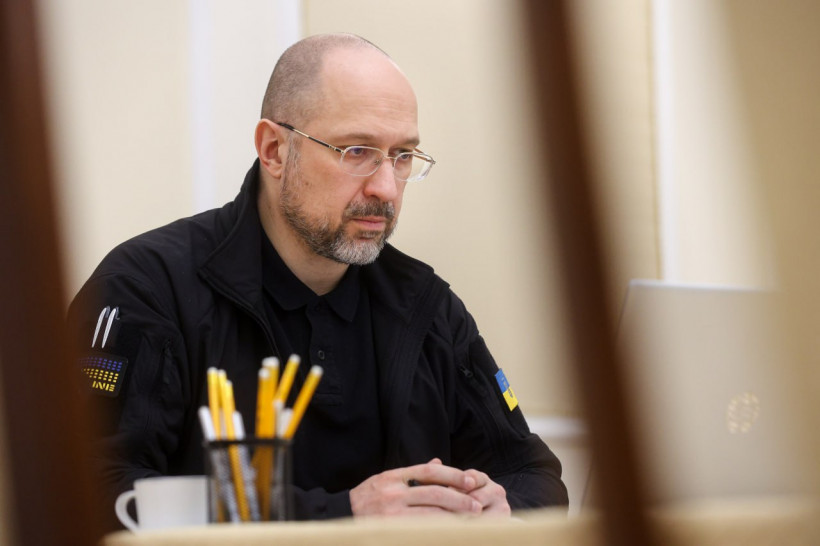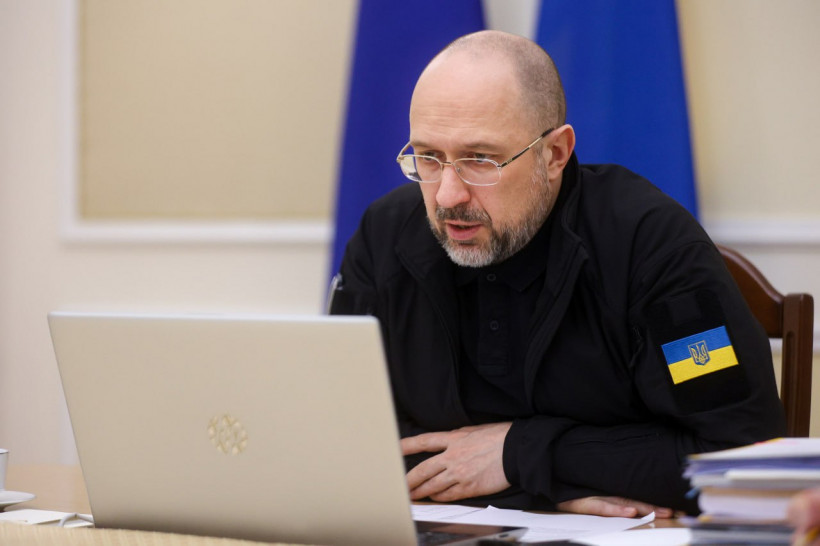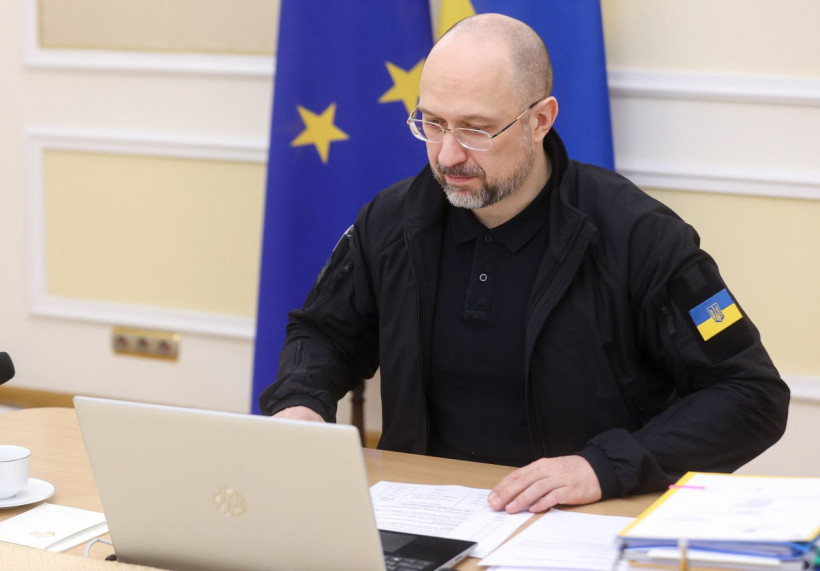Reconciliation? Not even in a hundred years
In an interview, Ukrainian Prime Minister Denys Shmyhal talks about the resilience of Ukrainian people, (zero) compromises with russia, and wartime camouflage etiquette
When President Zelenskyy posted a video from Kyiv the day after the war had broken out to show that Ukraine's leadership had not abandoned the country, Denys Shmyhal was also in the background. Since then, the former manager, who has been Prime Minister since 2020, has been in charge of state affairs from a heavily guarded government quarter. During air raid alerts, he receives guests in a bomb shelter. From there, the 47-year-old Prime Minister also has an online interview with the Focus.

Mr. Shmyhal, what changes has the year of war brought to you personally?
russia has been at war with Ukraine for almost nine years. During this time, all Ukrainians have changed, but especially since the invasion. On February 24 last year, a long day began, and it continues to this day. There is no more free time. I can count meetings with my family in hours, not days.
No one can work 24 hours in a row.
Unfortunately, we have to think about our victory round the clock. People who defend their country and sacrifice their lives inspire me to do so. And every time it gets hard, I ask myself: who is having a harder time? The man in the trench or me in the office?
War negatively affects the psyche.
No one expected such dramatic changes would trigger on the European continent. But I have no time for psychological analysis. We will proceed until we win. This is also a strategy to keep on track in these times of trials.

Ukraine is committed to get ready to join the EU within two years. Other countries took up to ten years. Doesn't your goal seem too ambitious?
There are other countries that have come this far not in ten or twelve years, but in five or seven years. We neither started our EU integration path yesterday, nor in June last year. This course has lasted for rather long. That is why we believe that this is an ambitious but realistic goal, and we can get the consensus of European States in the near future.
When the war is over, we want to live in a European, developed and civilized country. And we know exactly what needs to be done for this. We feel unity within the society and within the Government, and therefore we can adopt and enact European legislation and regulations rather fast.
Is the recent corruption scandal in the Ministry of Defense a sign of serious structural problems in Ukraine?
Ukraine is completing the build-up of its anti-corruption infrastructure. The institutions are fully functional and monitor all levels for corruption. Society has changed as a result of this war and no longer tolerates any signs of possible wrongdoing. We have zero tolerance for corruption. The response is immediate. The rapid detention of people suspected of abuse shows that Ukraine's approach to these issues has evolved. Today, there is no systemic corruption in Ukraine. Occasional instances of corruption - I emphasize the word "occasional" - are not tolerated, they are immediately dealt with.
The standard European conditions also provide for a reduction in the influence of oligarchs on the economy. Doesn't it pose a danger to get rid of hostile oligarchs and preserve friendly ones?
We have adopted an anti-oligarchic law and are working on improving the antimonopoly legislation. The oligarchic influence in Ukraine has significantly decreased since the onset of the war. Some of the oligarchs have left the country, others have lost their influence in the media. Almost none of them have any political power anymore. Many were forced to close their businesses in the east of Ukraine - their enterprises were either occupied or destroyed. We are pursuing market reforms. Small and medium-sized enterprises should be the basis for the future rehabilitation of Ukraine and its economy. The structure of the Ukrainian economy will undergo a change after this war.

During last year's Berlin Recovery Conference, Chancellor Olaf Scholz called on German entrepreneurs to invest in Ukraine. Did you receive any specific offers?
It was a significant signal, a true catalyst. Since then, interest has been growing, and not only from German companies. The issue of war risk insurance, which we have been working on, remains a significant obstacle. There are ten specific projects. And we have a proposal from a German company to jointly produce weapons. Unfortunately, I cannot mention the names.
The longer the war lasts, the more human casualties it causes. For how long will Ukrainians be able and willing to tolerate this?
Ukrainian society stands ready to fight for freedom and independence until we win. In this regard, it is psychologically important for us to have reassurances from international politicians that they will support us for as long as we need it.
More than 80% of Ukrainians want russia to withdraw completely from Ukraine, including Crimea. How much room for compromise with russia does the Government have?
We are a sovereign country with internationally recognized borders. The only compromise is the complete withdrawal of russian troops from Ukraine within the 1991 borders. The russians must stop shooting, halt their aggression and leave our territory. I believe that changing the borders would be an unacceptable compromise for Europe as well.

Is freezing the conflict an option to stop the bloodshed?
No, it would only play into the hands of russia and lead to another big war. This is not an option for us.
Would Ukraine be willing to give up territory if - as some experts suggest - it quickly gained EU membership and strong security guarantees for the rest of the country?
Ukraine does not see any compromises on its territorial integrity. The society will not accept this. Thousands of our best people have died not for us to seek a compromise with a bloody terrorist and aggressor who blackmails the whole world.
Is reconciliation and cooperation between russians and Ukrainians ever possible?
Reconciliation and cooperation - no, not in the next hundred years. First, russia must change, turn into a democratized, demilitarized and denuclearized country.
But how should moscow be disarmed?
Sanctions, denial of cooperation with russia, confiscation of russia's assets, military assistance to Ukraine. The past year has shown that the world can rapidly achieve things that previously seemed impossible. The delivery of almost all types of heavy weaponry, as well as the training of Ukrainian pilots, means that there is a prospect of further steps.
Was it a mistake for Ukraine to give up nuclear weapons in 1991?
Perhaps, if Ukraine had remained a nuclear power, this war would probably not have happened. What we can say for sure is that russia is a nuclear terrorist. And not only because it has nuclear weapons. The occupation of the Zaporizhzhia Nuclear Power Plant and its mishandling indicate clear terrorist intentions on the part of the russians. They have opened the floodgates of the Kakhovka Reservoir and are draining it. This may make it impossible to collect water to cool the ZNPP in the near future and could lead to a nuclear disaster.
Who actually came up with the idea that ministers and the president of Ukraine wear olive green shirts or camouflage uniforms all the time?
Consider it wartime diplomatic etiquette. These clothes connect us with the girls and boys who are giving their lives for our country. We will wear these uniforms until the war is over. They symbolize that Ukraine is fighting and will continue the battle. It is impossible to wear a suit and tie when your country is wearing a uniform and fighting